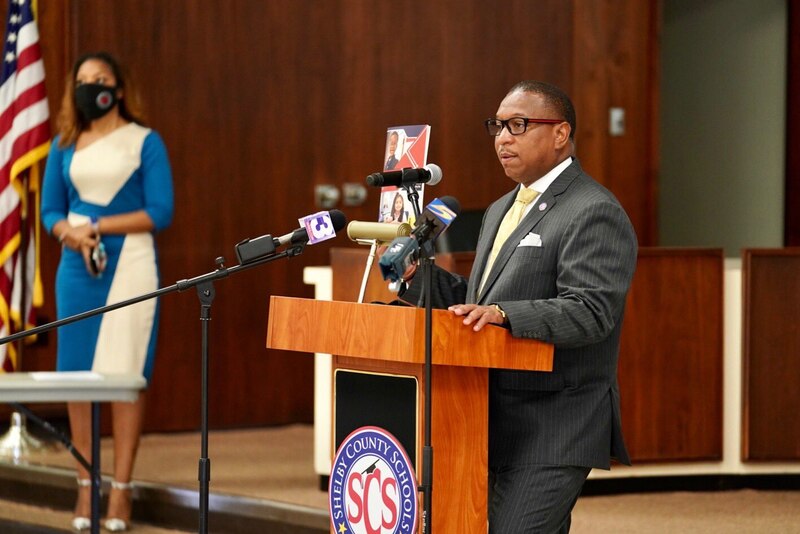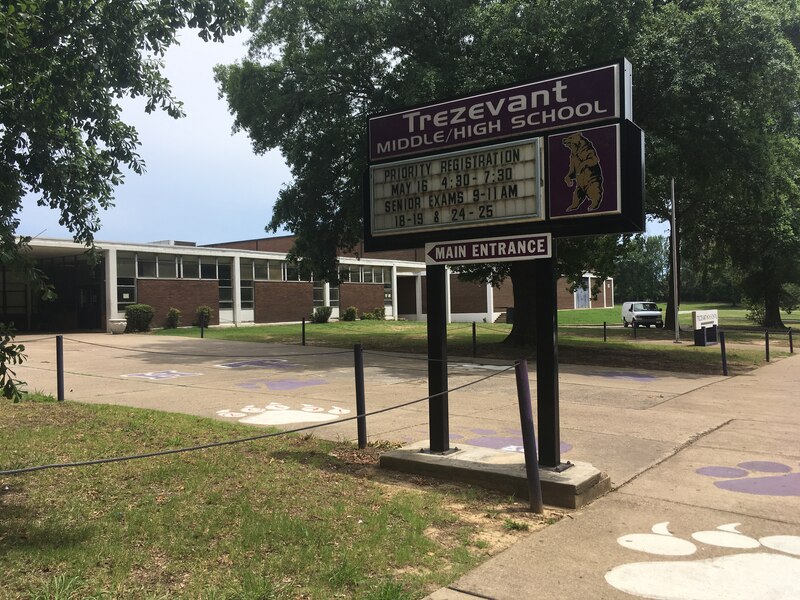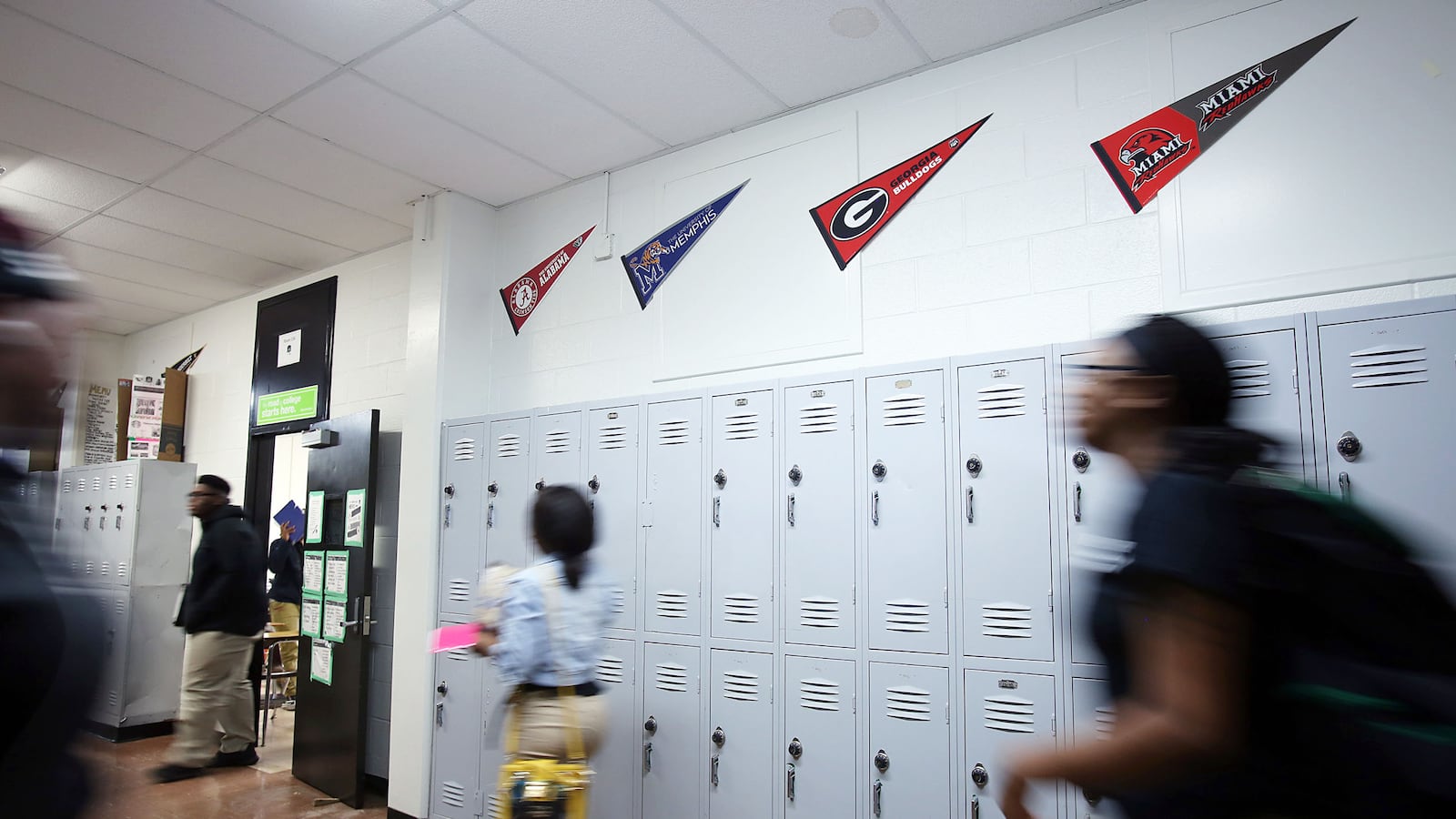The 2022-23 academic year is only beginning, but already, it’s shaping up to be a tumultuous one for Memphis-Shelby County Schools.
Tennessee’s largest school district has over 100,000 students and 6,000 teachers returning to classrooms for the first day of school Monday morning — but no full-time superintendent.
Last year didn’t produce the “comeback” that everyone expected after two years of pandemic-era school, so district officials have set their sights on continued recovery efforts, academic and otherwise.
And like most urban school systems across the country, Memphis faces a number of other challenges, such as declining enrollment, teacher shortages, rising gun violence, and concerns about student mental health.
Here’s a look at five key issues Chalkbeat Tennessee will be following here in Memphis as school gets underway.
Leadership question
Who will lead MSCS this school year — and beyond? That’s one of the biggest questions hanging over the district right now.
Superintendent Joris Ray remains on paid administrative leave pending an external investigation into whether he abused his power and violated district policies by engaging in relationships with subordinates during his tenure leading MSCS. Ray has said he’s confident he has not violated district policies.
Since the board launched the inquiry on July 13, Chalkbeat learned that at least two of the women Ray’s wife alleges in divorce filings that he had affairs with were people he supervised.
It is unclear whether the alleged affairs occurred while Ray was supervising the women, or whether the affairs would fall within the scope of the school board’s investigation. Asked whether the breadth of the investigation had changed, MSCS board Chair Michelle McKissack responded that “under the guidance of our legal counsel, the board must limit comments while the investigation is underway.”

The investigation of Ray began just a few days before early voting started in the Aug. 4 school board elections, and it could be up to a newly constituted MSCS board to decide how to respond to the findings.
After winning reelection Thursday, McKissack said former U.S. Attorney Edward L. Stanton III, who is leading the investigation, is in the process of conducting interviews, sorting through documents, and gathering information. She still doesn’t have a timeline for how long the investigation will last or when the board will take action.
McKissack and two other candidates who won board seats Thursday — Amber Huett-Garcia, who ran unopposed, and Keith Williams, a union leader and longtime critic of Ray — had expressed support during their campaigns for strengthening policies to hold the board’s sole employee accountable.
For now, John Barker, deputy superintendent for strategic operations and finance, and Angela Whitelaw, deputy superintendent of schools and academic support, are handling Ray’s duties.
Prolonged academic recovery
When the state unveiled 2022 standardized test scores early last month, MSCS officials celebrated an overall proficiency increase of about 6 percentage points and a near return to pre-pandemic levels.
But district officials were quick to acknowledge that the district has a lot of work ahead to get proficiency rates where they should be — signaling another year focused on academic recovery.
“We’re trending up; we have to celebrate our successes,” Ray said during a July 6 press conference, calling the scores a sign that the district made “an unprecedented comeback.”
But, he added, there’s “still miles to go before we sleep.”

Heading into the new school year, district officials say they will continue strategies adopted last year to boost recovery, including increasing small group instruction, expanding before- and after-school tutoring, offering more honors and Advanced Placement courses, and expanding the district’s CLUE program for talented and gifted students.
The district also plans to stay focused on improving literacy, especially among its youngest students. In the last couple of years, MSCS has spent millions of federal COVID relief dollars to add more teaching assistants to kindergarten, first, and second grade classrooms. The district has also worked to forge partnerships with community organizations such as First 8 Memphis and the Urban Child Institute to lift early childhood literacy.
“There is so much momentum behind the growth that we’re experiencing as a school district and that’s what I would like to see us build upon,” McKissack told Chalkbeat Thursday, after beating out two challengers in the race for school board District 1. “We need to keep going to make sure our students continue to have that level of growth in the years to come.”
But the COVID relief funds will run out soon. When that happens, will the district be able to sustain its gains and make significant long-term progress?
MSCS predominantly serves students of color who come from low-income families, the groups that were hit hardest academically by the pandemic. Ray has hinted that improving student achievement in the district will take more than those efforts funded by temporary federal COVID relief aid. He’s called for more community support, from parents taking the time to read to their children, to increased financial support from the state and county.
Stalled construction projects
Memphis school officials and community members had high hopes this spring when a proposed budget for the 2022-23 school year included plans for a host of capital improvement projects, from school renovations like replacing boilers and fire alarm systems, to a new $89 million high school in Frayser.
But that proposal hinged on the district’s request for $55 million in capital improvement funds from Shelby County. And for a second year, county commissioners decided to grant MSCS less than half its request, forcing the school board to again delay several flagship projects from its Reimagining 901 school improvement and facility plan.
As part of a revised $2.1 billion budget, officials put the new Frayser high school on pause indefinitely, and slashed more than $10 million of planned work at Richland Elementary, Tobey Park, and Raleigh Egypt High School.
Heading into the new school year, those projects remain in limbo, and it’s unclear how school officials will approach their relationship with the County Commission next spring and in years to come.

In an interview earlier this summer, MSCS board Vice Chair Althea Greene cautioned district families that concerns about school maintenance, modernization, and beautification projects may not be addressed as quickly as the district had hoped.
“We can only spend what’s allocated to us,” Greene said.
And in the meantime, most Memphis students will continue to attend aging school buildings, many of which have racked up millions of dollars of deferred facility maintenance.
“I feel like we are being held hostage here in Frayser by the funding situation,” Regenia Dowell, treasurer of the Frayser community’s parent-teacher-student association, said after the funding setback.
Teacher vacancies
Across Tennessee and the nation, school officials are grappling with a continuing teacher shortage, as the educator pipeline continues to shrink and burned-out educators leave the profession.
“I have never seen it this bad,” Dan Domenech, executive director of the School Superintendents Association, recently told The Washington Post.
In Memphis, the district is set to start 2022-23 with fewer vacancies than last year, when vacancies hit at least a five-year high.
As of Aug. 2, the district had 180 teaching vacancies across about 160 district-managed schools. The district has a total of about 6,000 teachers, meaning about 97% of instructional positions have been filled.
Last year, the district reported 217 unfilled teaching jobs on the first day of school — and that number grew to 227 in the first month of school.
MSCS officials have attributed the decrease to a new state law allowing retired educators to return to the profession without losing their retirement benefits, as well as the district’s “extensive work” on teacher retention and recruitment.
Ray pledged this year that the district would focus on better supporting its teachers through efforts like boosting salaries, offering bonuses, increasing professional development opportunities, and expanding health care coverage for all staff.
And to address the remaining vacancies, district officials say, plans are in place to cover classrooms by combining under-enrolled courses, sending certified central office staff and substitutes to fill gaps, and using remote instruction for some higher-level courses.
Still, as the district continues COVID academic recovery efforts, some parents and community members wonder if the district’s staffing strategies and tactics will be enough to meet the recovery needs, and whether they’re an adequate substitute for having a high-quality educator in every classroom.
Declining enrollment
With fewer young children living in cities, urban school districts across the country are poised to see even more punishing enrollment losses this year, according to a new analysis examining population trends since the pandemic hit.
“The population data suggests that the shoe has yet to drop for K-12 school districts,” wrote researchers with the Economic Innovation Group, a bipartisan economic policy organization. “Today’s smaller crop of children under five will translate to lower K-12 enrollment in years to come.”
Memphis will likely be no exception.
Last year, enrollment in Tennessee’s largest school district declined. Sixty-day counts showed nearly 4,000 fewer students had enrolled in MSCS, including charter schools — a decrease of just over 3% from the previous year.
It was the second straight year of enrollment losses. After the first, MSCS officials speculated students left the district in favor of in-person learning. But the decline didn’t stop after face-to-face learning resumed in MSCS last year — and it’s already affecting school funding. This year, the district will receive about $18 million less from the state based on student counts from 2020.
During budget discussions in May, Toni Williams, the district’s chief financial officers, said the district has been able to weather decreased state funding so far. But if enrollment continues to shrink this year, Memphis and other urban districts across the nation may suffer financially and face pressure to lay off teachers or close schools.
Samantha West is a reporter for Chalkbeat Tennessee, where she covers K-12 education in Memphis. Connect with Samantha at swest@chalkbeat.org.

